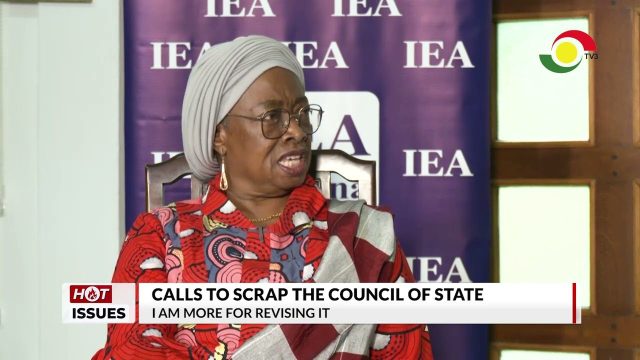Former Chief Justice Sophia Akuffo has weighed in on the heated debate over the future of Ghana’s Council of State, arguing that the advisory body should be revised rather than scrapped.
Speaking on TV3’s Hot Issues with Keminni Amanor on February 23, Akuffo emphasized the need to strengthen the Council’s role in Ghana’s democratic governance, suggesting it could be transformed into a non-partisan upper legislative chamber to enhance oversight and decision-making.
The Council of State, established under Article 89 of Ghana’s Constitution, serves as an advisory body to the President on key national issues. However, critics have long questioned its effectiveness, with some calling for its abolition, citing concerns over redundancy and excessive reliance on the executive branch. Akuffo, who served on the ninth Council of State, acknowledged these criticisms but argued that reform, not dissolution, is the way forward.
“I’m more for revising it,” she stated. “Some are of the view that the Council of State should, in fact, be converted to a second legislative chamber, like an upper chamber. So that matters like the finances of the country, defense, and other key areas, they have a say in it before it is finally decided.”
Akuffo’s proposal reflects a growing sentiment among governance experts who believe Ghana’s democracy could benefit from a more robust system of checks and balances. By transforming the Council into an upper chamber, she argued, the body could play a more active role in scrutinizing critical decisions, particularly in areas like national security and fiscal policy.
However, Akuffo cautioned that such a reform would require careful legislative safeguards to ensure the chamber remains non-partisan and independent. “One would also have to come up with a formulation to ensure that even though they are there, they are still not there in a partisan capacity,” she explained. “Otherwise, we might end up like some countries we know, where such bodies become rubber stamps of the Chief Executive.”
Her comments come at a time when Ghana’s political landscape is increasingly polarized, with calls for institutional reforms gaining momentum. Proponents of an upper chamber argue that it could provide a platform for experienced statesmen and women to contribute to national decision-making without the pressures of partisan politics. Critics, however, worry that such a move could complicate governance and lead to bureaucratic inefficiencies.
Akuffo’s nuanced stance highlights the complexities of reforming Ghana’s governance structures. While she stopped short of endorsing a specific model, her emphasis on non-partisanship and enhanced oversight underscores the need for a balanced approach.
As the debate continues, one thing is clear: the future of the Council of State will depend on its ability to adapt to the evolving demands of Ghana’s democracy. Whether through revision or transformation, the goal remains the same—to create a governance system that serves the best interests of the people. For Akuffo, the path forward lies not in dismantling the Council but in reimagining its role for a new era.
Send your news stories to newsghana101@gmail.com
Follow News Ghana on Google News


















